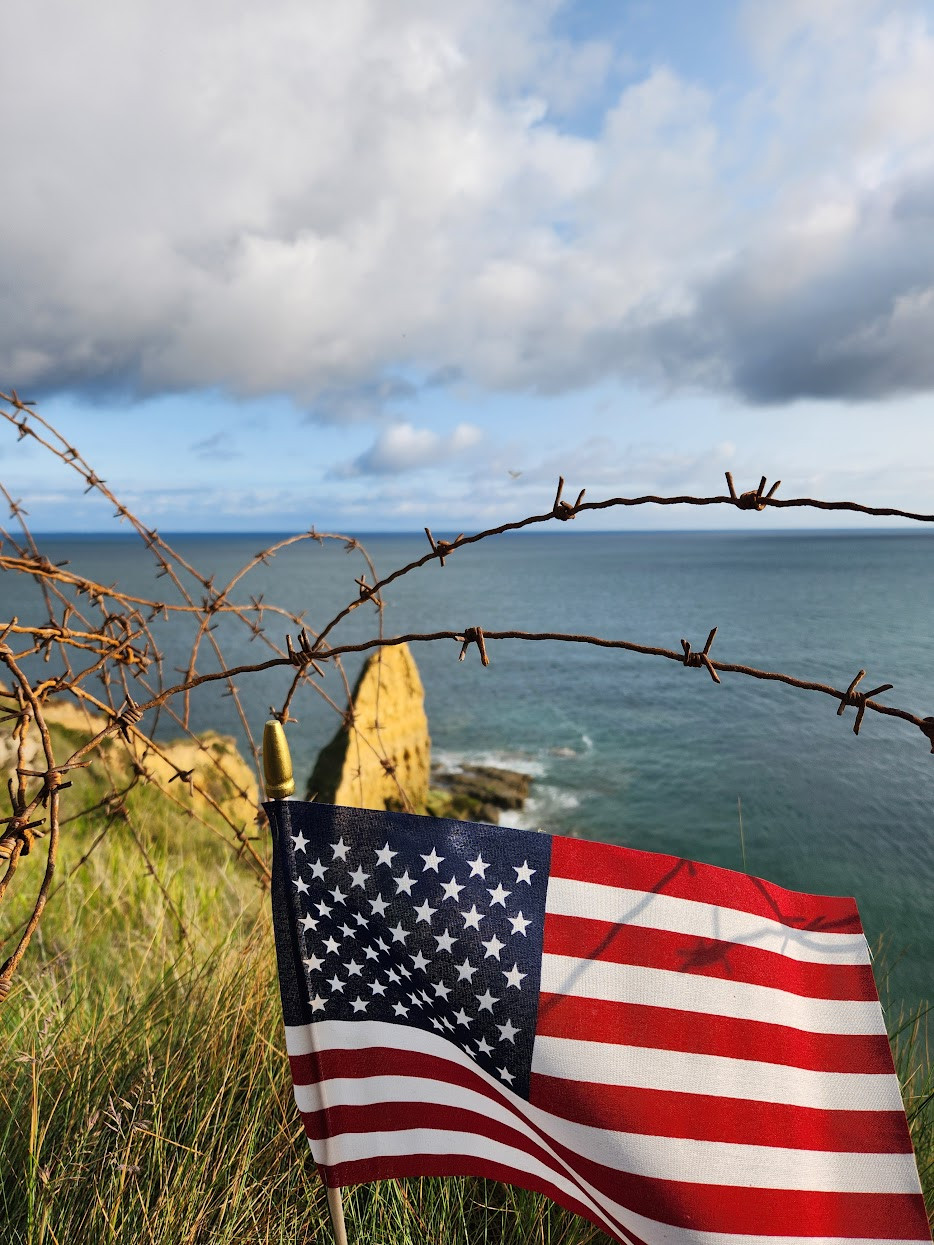On June 6, 2025, the 81st anniversary of the D-Day landings on the beaches of Normandy, I had the opportunity to be standing on Omaha Beach. That week, my wife and I, accompanied by a couple who are close friends, were on a tour of the Normandy battlefields hosted by the National World War II Museum based in New Orleans. I’ll spare you a recap of the trip by summarizing it as amazing, thought-provoking, humbling, emotional, and encouraging all mixed together.

On our 10+-hour flight home, I had plenty of time to reflect. I was moved by the number of parallels I sensed in what made Operation Overlord a success and what I have seen that leads to successfully leading churches to accomplish their purpose and mission. The more I thought about it, the more I believed that this, for church leaders, is something to talk about.
Author John Maxwell in many of his books writes, “Everything rises and falls on leadership.” I’ve found that to be true over and over again. Yet from time to time, I encounter church leaders that act as though effective leadership is driven by their exercising of power and that strong leadership can include bulldozing over those that might disagree, failing to listen to the concerns of others, insisting on their own way based upon their “rank” in the organization. On the other hand, I’ve encountered church leaders who are unwilling to lead – they have difficulty making decisions appropriate to their role and responsibilities, capitulate under pressure, assume that leadership means that no one leads within the team of leaders because all are the same, that assume a plurality of leaders means that no one leads within the team of leaders, regardless of their gifting, skills and responsibilities.
Throughout this article, when I use the term “leadership” I am referencing mature, godly, Christ-honoring, servant leadership that does not lord over others on the one extreme, nor abdicate leadership on the other.
Here are some of the thoughts that come to mind as I reflected upon the heroic actions of so many of the people that fought in the battles that eventually freed Europe from the scourge of the Third Reich and resulted in the Nazi’s surrender and the return of freedom to the nations of Europe. These lessons from history are of no value and makes us prone to commit the same mistakes of the past unless we engage in appropriate thoughtful reflection – such reflections are indeed something to talk about with your leadership team.
There’s a difference between purpose and mission.
The purpose of the allied armies was to win World War II by driving the Nazi army out of occupied Europe back to Germany and forcing their surrender. There were many different missions within that purpose – individual commands, platoons, squadrons, etc., had unique missions in unique areas that were all designed to accomplish the purpose of the invasion. Bringing glory to God by accomplishing all aspects of the Great Commission is the purpose of the universal church. Individual congregations have different missions (where and how they will do so), but we all have the same purpose. What is your church’s purpose and what words do you use to communicate it to your church family? Is the Great Commission prominent? How do you describe your church’s unique mission in doing so? Do you have clarity? Are the members of the church engaged in your mission? Do they understand it and embrace it and act upon it?
Leaders lead from the front.
Yes, General Eisenhower (the supreme allied commander) and his staff were elsewhere (it would have been impossible for General Eisenhower to be present among so many people in so many places, though he still connected with subordinate leaders and line troops as best he could), but it was the majors, captains, lieutenants, and sergeants that led the troops on the battlefield. Are the leaders of our church leading from the front? To “prove to be examples to the flock” the flock needs to see us doing the things we (and they) should be doing. Are we telling people what to do but not doing those things ourselves? Are we leading from the front – with and among the people we are leading?
Everyone knew who their leaders were.
There was no plurality of leaders – instead there was a hierarchy of leaders. Don’t get upset with me yet; I am all for a team of people serving as the leadership boards in our EFCA family of churches as this is our best method of holding leaders accountable. We know that power oftentimes corrupts. Even the supreme allied commander was accountable to the heads of the allied states. The concept of hierarchy deals with communication, coordination, order, and direction rather than power. Those in the highest command positions listened to others and then as a team made their decisions, with General Eisenhower responsible for the final decision (this was by agreement). Is it clear in our churches who is responsible to lead what? Who is the final authority for decisions? What decisions are reserved to the board and what decisions may be made by pastors and staff? How do we ensure that all the “units” in our church are moving the same direction toward accomplishing our mission and know who they report to?
Planning and improvisation go hand in hand.
“Fail to plan; plan to fail” “No plan survives the first contact with the enemy.” These truisms appear contradictory, yet both are true. Absent a thoughtful, actionable, and attainable plan, efforts typically fail. It is foolish to institute a ministry having given little or no thought to what we want it to be, to do, and to accomplish and what it will take to get there. Yet, all plans are based upon assumptions that may or may not come to pass so it is foolish to be slavishly attached to a plan that is not working. The implementation of plans requires leadership to navigate the changing conditions encountered during implementation and to improvise as needed. In the Normandy invasion, many airborne units completely missed their landing zones, many times by miles. Troop landing craft were blown off course by winds, tides, currents, and enemy fire and landed away from their planned landing sites. Nonetheless, the leaders of these teams went about the best they could to accomplish as many mission objectives as they could, despite casualties inflicted by the enemy. Do ministry leaders have both the permission and ability to make adjustments to their plans when circumstances change? Does our church board embrace the flexibility they need to make similar adjustments based upon circumstances they encounter? Are we driven by policy rather than common sense and wise discernment in the face of the enemy?
An army cannot move without logistics.
The ratio of troops assigned to combat versus logistics/support is known as the “tooth to tail” ratio. In recent years the “tooth-to-tail ratio” has been about 25% to 75% - 25% on the front lines and 75% supporting them. A functional army needs a lot of support. Food, shelter, fuel, mechanics and their machines, sanitation, arms and bullets/shells, and a means to transport all this stuff to where the combat is taking place is required, as well as ongoing training to prepare replacements over time. As church leaders, how much effort do we expend on supporting our ministry efforts? Do we celebrate those supporting the ministry behind the lines or only those on the front lines? Are we getting the tools and resources our front-line people need to them? Have we asked about their needs (and even their wants)? Although the military’s tooth-to-tail ratio seems out of whack for a church, our “tail” personnel are still important. Armies and ministries do not move without logistical support.
Everything rises and falls on leadership.
The military expends great time and effort to find, develop, and deploy leaders. Are we doing the same in our churches? While not everyone needs to be a leader, we do need leaders. What are we doing to locate and develop “officer candidates?” How are we training our leaders? Is all our training and equipping done before their deployment, or do we provide ongoing development and skill building for ministry leaders – all of them from top to bottom? We do not need to wait until a vacancy occurs to begin looking for new leaders – this should be ongoing. What are we doing to ensure that we will have the leaders we need before we need them? And what are we doing to hone and expand the leadership skills needed by our current leaders as they lead into the future?
Expect casualties.
There was terrible loss of life and casualties during the Normandy landings on D-Day. At least 4,414 allied troops, 2,501 of them American, were killed on D-Day – there were about 10,300 total casualties (killed, wounded, missing). It was amazing to me that when casualties occurred among military leaders, the “next man up” took over the leadership responsibilities. Many of these “next man up” leaders eventually earned significant battlefield honors and awards for their heroism and skill in leading their men. The success of these “next man up” leaders did not just happen – it was planned for. When a leader went down, someone stepped up to take command. Who are the next ones up for our ministries? Churches lose leaders frequently due to job changes, staffing changes, illness, moving, death, and all sorts of changes. Who are our potential next ones up for our key leadership roles? If our student ministries or worship leader leaves, do we have someone prepared to fill the gap at least for a season? If our lead pastor goes down for a day or a season, who will step up that day? Are we preparing ourselves for the inevitable or just wishing and hoping it will never happen?

Celebrate victories.
Our experiences in Normandy were sobering, yet there was joy throughout the countryside as the people of Normandy celebrated together the anniversary week of the landings on Normandy’s beaches. Flags of France and the Allied nations were flying together all around. The invasion, despite the pain it afflicted on the residents and the death and destruction incurred in their cities, towns, and countryside, was celebrated because the purpose of the invasion was achieved – the liberation of France and Europe and the end of the European war. Freedom is a wonderful thing, and we are free in Christ Jesus. Do we celebrate our church’s successes? Do we cheer baptisms and testimonies? Celebrations encourage leaders and soldiers to keep at it despite the challenges.
Certainly not every military leadership concept directly transfers to church leadership. But to a certain extent, good leadership is good leadership wherever leadership is found, and we can learn a lot from studying leadership in other organizational contexts. My prayer is that this brief look back at the heroics, grit, determination, planning, execution, and courage of this turning point battle of World War II will be an encouragement to church leaders to intentionally and continuously grow in their capacities to lead. Good leadership doesn’t just happen – it is intentional. Let’s be fearlessly intentional in our leadership work for God’s Kingdom.
Let us know if we can help and how your conversation goes. Contact Bob Osborne by e-mail at bob.osborne@efca.org.
This is one of a series of articles intended to facilitate and guide church leaders’ conversations about significant issues that often are not talked about among pastors, boards, and church leadership teams. Visit the EFCA West website to see prior Something to Talk About articles.
Both quotes are well known and attributed in various forms to different people.
Data from the National WWII Museum website.

